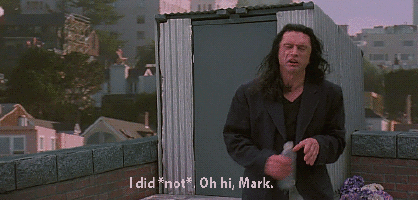From a technical standpoint, the sheer level of incompetence on display in “The Room” is staggering.
Written, directed, produced and starring the indeterminately-accented Tommy Wiseau (“Samurai Cop 2: Deadly Vengeance”), this romantic drama entered the cultural zeitgeist virtually the moment it came out in 2003 (not to be confused with Oscar-nominated “Room,” which came out in 2015).
On a basic level, “The Room” is a story of lost love, detailing a woman’s affair with her fiancé’s best friend. Focusing on Tommy Wiseau’s Johnny, his fiancée Lisa and his best friend Mark, the plot tracks Lisa’s growing lack of feeling toward her husband-to-be, and the growing realization in Johnny’s mind that all is not well in their relationship.
But summarizing the plot simply cannot do this film justice. For starters, Lisa, played by Juliette Danielle (“The Story of Sarah 2”), is one of the most reprehensible humans ever portrayed on film. Early in the film, she arrives at the conclusion that she no longer loves Johnny, and then proceeds to behave like a men’s rights activist’s dream. [wut?]
Lisa coerces sober Johnny to drink “scotchka,” a vile-sounding concoction that should be avoided at all costs, cheats on him with his best friend, belittles him for not getting promoted at work, falsely accuses him of hitting her and otherwise behaves like a super-villain. It’s somewhat hilarious how comically evil this character is.
It’s pretty clear Wiseau was going for a Lady Macbeth-type character with Lisa, but ended up with a caricature unlike any real person. But Lisa is by no means the only display of poor writing on the screen. The lack of understanding about the conventions of screenplays on Wiseau’s part is simply astounding.
Calling events of “The Room” a plot is a bit too generous; it’s mostly just a series of stuff that happens to keep the movie from ending for a while.
So many subplots are introduced and then promptly dropped, with only a sad facsimile of an overarching story connecting them together. The main arbiter of subplot chaos is Denny, played by Philip Haldiman (“A Room Full of Spoons”). According to Lisa, Johnny attempted to adopt Denny, but was turned down in some way. Instead, Denny is somehow their next-door neighbor, and exists to interject some occasional absurdity into the movie.
His two main contributions to the story are asking if he can watch Johnny and Lisa have sex and getting into trouble with drugs. The latter is one of the most mystifying sequences in cinematic history, and deserves a full summary. Denny is standing on the roof of the building with a suspicious-looking man, who pulls a gun on him demanding payment for drugs. Before he can do anything, Johnny and Mark come up and whisk him away, saying he’s going to jail. Denny is then berated by Lisa’s mother, who appears every now and again to add another layer of confusion to this mess of a movie.
It is necessary to point out that nothing that occurs in this scene is ever mentioned again, as with many other things that are introduced in this filmic failure. There is so much more awful in “The Room,” but really, it cannot be described. It must be experienced, of course, with a proper amount of mental preparation beforehand.
Final rating: 5 unresolved subplots out of 5








